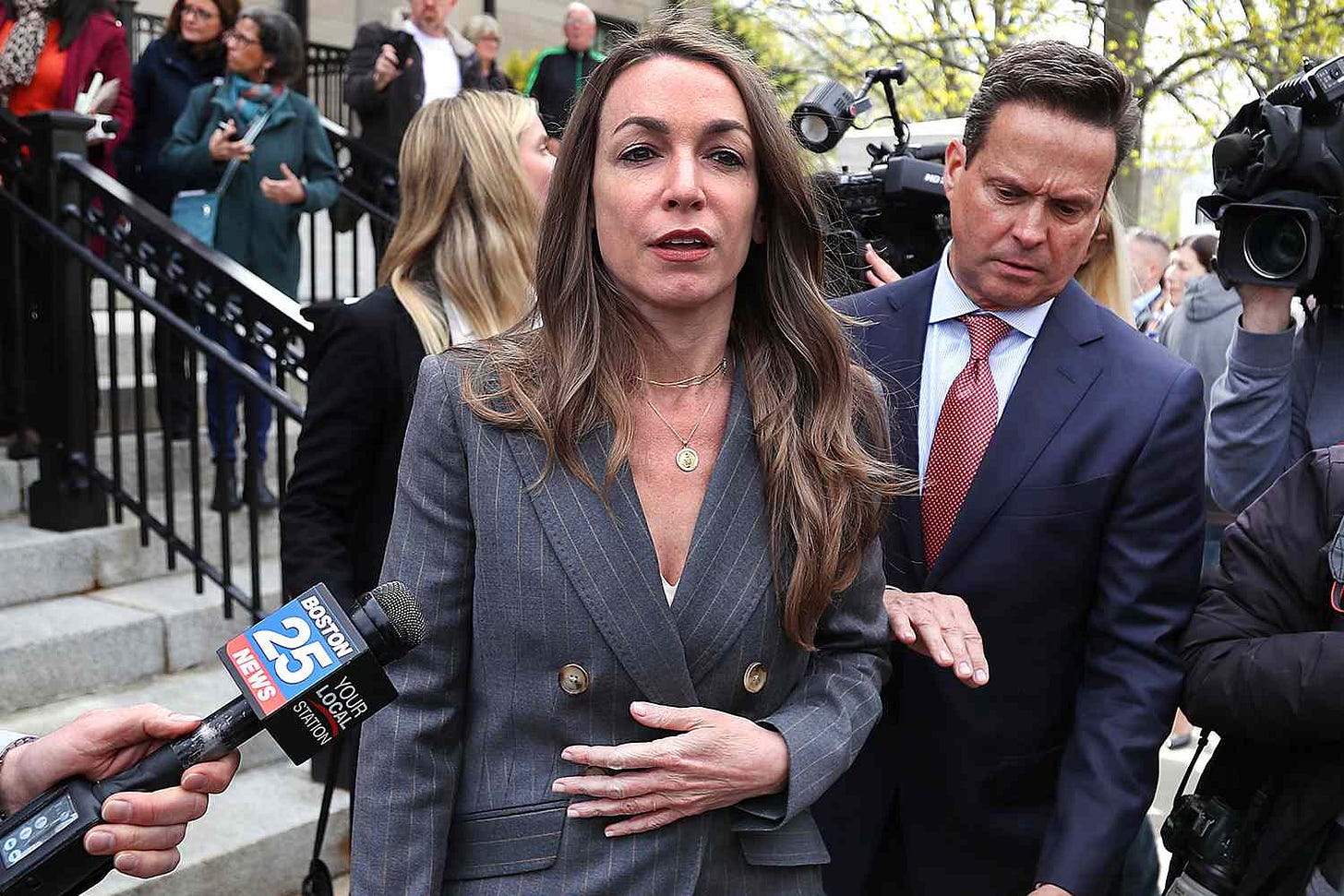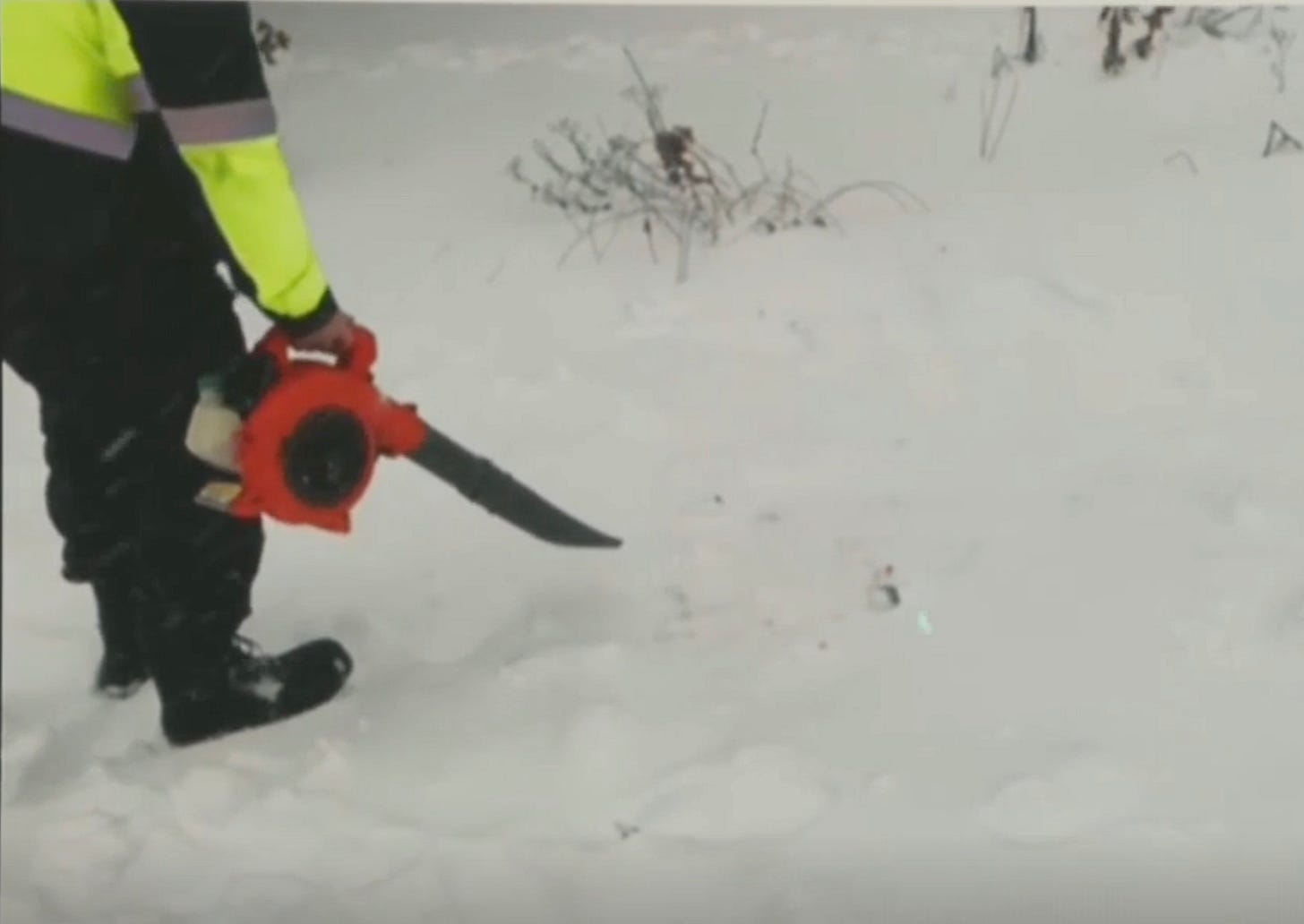Reforming the state police is not enough
What a Boston cop’s murder reveals about Mass. state homicide investigations
Every so often a murder trial strikes a nerve. From Lizzie Borden, to Louise Woodward, to Michelle Carter, in Massachusetts, these defendants are often educated white women. The case against Karen Read, a charismatic business school adjunct accused of killing her Boston cop boyfriend, is like those cases. But it’s most like the O.J. Simpson trial because of what it reveals about police and how the public perceives law enforcement at this moment in time.
I was one of countless others who spent the last three months fixated on Massachusetts v. Karen Read and the resulting mistrial. The Read case played out like a made for TV drama. Like Cops meets The Real Housewives, as told by influencers. There are plots and subplots. Proceedings in and out of the courthouse have the tenor of a bar brawl.
I watched in horror and the legal saga is far from over. But this essay is not about Read’s innocence, guilt or legal strategy.
Instead, I’m relaunching Zalkind Notes with an essay about policing. There are concerning similarities between the state investigation into John O’Keefe’s murder and the triple homicide in Waltham, the case I reported on for more than a decade.
Massachusetts investigates homicides differently from every other state in New England. So this is also inherently an essay about county district attorneys offices and Governor Maura Healey’s track record as Attorney General.
I am also thrilled to announce an event at the Cambridge Public Library on Thursday July 25 from 6-8pm in conversation with Becky Cooper. Becky is the author of We Keep the Dead Close: A Murder at Harvard and a Half Century of Silence, a beautiful and exhaustive investigation into the murder of Jane Britton.
I am really looking forward to this conversation. I hope to see you there in person or online. Please register.
If you haven’t read the book, The Waltham Murders: One Woman’s Pursuit to Expose the Truth Behind a Murder and a National Tragedy please check it out. My docuseries The Murders Before The Marathon is streaming on Hulu.
Here is the essay:
Much like O.J. Simpson’s murder trial, the Karen Read mistrial, was an indictment of law enforcement and the surrounding spectacle has overshadowed the tragic death of the victim, Boston police officer John O’Keefe.
In the Simpson case, defense attorney Johnnie Cochran suggested his client was framed by a racist cop while his apathetic colleagues stood by. Cochran implored jurors, “Who then polices the police?” The suggestion being that they could–with an acquittal.
Read’s attorneys claim she was framed in a sprawling police conspiracy in which first responders, Canton police, Boston police, state police, family, friends, and a federal agent all conspired to frame an innocent woman from Mansfield, Mass.
Like Simpson, people may view the Read trial differently in time. But the investigation into O’Keefe’s death was objectively terrible. Investigators did not secure the crime scene or rule out alternative suspects. They interviewed witnesses in groups in their homes, wrote sloppy reports, and were reckless with key evidence.
To be sure, the most accessible and outrage-inducing examples can be found in the lead investigator’s text messages. Michael Proctor, a state trooper then assigned to the Norfolk County District Attorney’s Office, called the defendant a “whack job c***” and worse.
But the problems with Mass. state homicide investigations do not begin or end with Proctor. Nor are they limited to the state police. Because in Massachusetts, homicide falls under the jurisdiction of county District Attorney offices.
Massachusetts is the only state in New England that does not have a centralized statewide major crimes unit.
Instead the commonwealth has eleven satellite units of state troopers assigned directly to county District Attorney offices. Prosecutors and state police work closely together to investigate unattended deaths.
There are inherently more conflicts in the way we do things here and fewer ways to address them. Although Mass. state police boast a high solve rate, investigators are also apparently ill equipped to investigate complex homicides. This was evident in the first moments of the O’Keefe investigation.
Read was accused of hitting O’Keefe — who was her boyfriend — with her car and leaving him to freeze in the snow outside the home of another Boston cop in Canton on Jan. 28, 2022. But he was not yet dead when Canton police found him, and that was one of the first factors that apparently threw off investigators assigned to the Norfolk County District Attorney’s Office.
When O’Keefe was found in the snow with blunt force injuries, Canton police Lieutenant Paul Gallagher called the state police right away.
But the state police at Norfolk did not rush in. “Mr. O’Keefe was still alive. So they declined to respond at that time,” Gallagher testified in court.
Unlike major crimes units, our satellite county units are only designated to suspicious or unattended deaths leaving a lot of room for discretion.
For example, in Connecticut, the state police major crimes unit would take over as soon as they were called, according to Sergeant Luke Davis. In situations like this one where it is “incredibly obvious that there's something wrong,” the major crimes unit steps in right away, Davis said.
They also secure the scene “to limit movement,” Davis said. With any kind of foot traffic or disturbance, there is a higher probability of damaging evidence prosecutors might need to win a case, he explained.
But when a Boston cop was found severely injured in the snow, Massachusetts State Police apparently left Canton police to handle things on their own. Canton officers used a leaf blower to search for evidence. “I figured we could direct the snow off the area in a controlled fashion,” Gallagher testified. Being resourceful with what they had on hand, they collected frozen blood in red Solo cups.
Read’s attorneys contended this was part of an ingenious cover-up meant to protect Brian Albert, the Boston cop who lived inside the home, and his associates. On the night in question, Albert was hosting a party with his family. The defense alleged the real killer was inside the house.
We don’t know what happened in that house because state investigations never looked. And because prosecutors are intimately involved in homicide investigations, it would be difficult for Assistant District Attorney Adam Lally to present the other reasonable explanation for this lapse—that investigators were fundamentally inept—without implicating himself.
Was this corruption? Incompetence? Poor protocol? I ran into similar questions trying to make sense of the state investigation into the officially unsolved Waltham triple homicide in Middlesex county. One of the victims was my friend, Erik Weissman.
Although the case is still open, the evidence overwhelmingly suggests that Tamerlan Tsarnaev and his cage fighter associate Ibragim Todashev, killed the three men. Investigators apparently failed to pursue obvious leads that could have led to Tsarnaev’s arrest before he bombed the Boston Marathon 18 months later.
In Waltham, all three victims sold marijuana. Among other conflicts, the victims bought weed from and members of local law enforcement socialized extensively with the same drug dealer, Safwan Madarati. I found evidence that state investigators working closely with local police, including a multi- municipality drug task force, may not have followed certain leads for fear of what a thorough investigation might reveal about their own illicit activities, or those of their colleagues–even if those illicit activities had nothing directly to do with the murder itself.
We don’t know why the investigators tasked to the Middlesex County District Attorney’s Office handled the Waltham case as they did. What’s most concerning is that there has been no accountability for these missteps or public reassurance that these problems have been looked into and addressed.
But the Waltham case is also why I did, at times, think Read’s defense theory of a complex police cover-up could be plausible.
Murder investigations are revealing. When done well, at least. Investigators often uncover additional information that others ideally would not like to have unearthed. But following every lead is crucial in order to pinpoint the assailant and secure a conviction.
There are no exceptions. “All the leads should be run to ground,” former Boston and Lowell Police Commissioner Edward F. Davis told me in a 2021 interview about homicide investigations at large.
When O’Keefe eventually succumbed to his injuries and the state police did get involved they did in fact cover for the Boston cop who owned the property where O’Keefe was found.
“I'm sure the owner of the house will receive some shit,” a friend texted Proctor in the early hours of the investigation.
“Nope. Homeowner was a Boston cop, too,” replied Proctor.
Was this part of a plot to frame Read? Or is it indicative of police culture at large?
My reporting on the Waltham case indicates that the latter is more likely, and that’s just as disturbing.
To me, Proctor’s account called to mind the accounts of local police officers I interviewed for the book, who said their superiors routinely chastised them for so much as ticketing powerful players in town. In another reported account, a state trooper claimed his superiors ordered him to alter a police report implicating a judge’s daughter.
Watching the Read trial, you don’t have to believe that police got away with murder in this particular incident to see how they might.
Which is why investigations involving off-duty police – be they victims, suspects, persons of interest, or even just witnesses – should be subject to more scrutiny not less.
“[Police] are people just like anybody else,” says Dennis Galvin, a retired major with the State Police and president of the watchdog Massachusetts Association for Professional Law Enforcement (MAPLE). “You get the wrong people in that position, they can do serious damage.”
The newly enacted POST Commission is now available to pursue individual complaints of misconduct by on-duty and off-duty police in Massachusetts. But it’s not clear if the POST Commission can address the structural issues behind the inherent conflict we see on display here.
Not only do state police and prosecutors oversee homicide investigations together, the District Attorney, an elected official, directly selects the unit commander. That means there is a lot of overlap between police and prosecutors at the county level, and as Galvin puts it, “that subtle check and balance between the police and the prosecution has somewhat gone away in Massachusetts.”
In other states, where major crimes regional divisions do not directly correspond to county prosecutorial districts, it’s easier to switch out conflicted actors. But our state troopers working murder investigations are also more localized and that means it’s more likely that a conflict might occur.
Prosecutors and state police's frequent collaborations with local police and federal liaisons tasked to county districts also makes it difficult to seek accountability when something goes wrong. For example, in the Waltham triple murder case, after the bombing, investigators taking orders from the Middlesex County DA’s office orchestrated an interview resulting in Todashev’s death. Two state troopers were there but because an FBI agent pulled the trigger, the Middlesex office was able to avoid public scrutiny.
The interconnectedness of what was essentially a Norfolk County law enforcement cluster was on full display in the Read trial. It’s part of the reason why the defense was able to imply there was a Canton cabal working together to frame Read.
Much has been made of how Proctor, the lead investigator, had personal relationships with witnesses who said they saw O’Keefe and Read at a bar before the murder. Proctor was also working a Norfolk County homicide case with the homeowner’s brother, Kevin Albert, a Canton police detective. Proctor’s superiors, including prosecutors in the Norfolk County DA’s Office, should have been aware of that connection immediately.
Last August, Norfolk District Attorney Michael W. Morrissey declared that Proctor had “no conflict” and no reason to step out of the investigation into O’Keefe’s death, suggesting this is standard practice. But as Galvin points out, when it comes to conflict of interest, the guiding principle in law enforcement is supposed to be “what could the public perception be?” not whether any actual conflict occurred.
Davis, of Connecticut State Police, told me the same principle applies there. “It's very important for the public to understand that every single one of us are going to work with the best intentions,” he said.
A handful of local police departments in big cities like Boston, Worcester, Springfield, and Lowell have their own homicide units and their own homicide detectives. But elsewhere in the state, state troopers assigned to District Attorney’s offices are the only members of law enforcement trained to handle the most serious of crimes.
But the Read trial, like my reporting in Waltham, raises questions about if this training is sufficient. These satellite county units have recently been renamed to Mass. State Police Detective Units and in the Read case the prosecutor frequently referred to troopers as detectives as well. That title is misleading. Although some of the unit commanders are detective lieutenants, the troopers on the ground, and their primary and secondary superiors are not detectives, which means they don’t graduate from competitive detective track programs.
They do go through training programs but there is no standardized test. And according to Tom Nolan, a criminologist and former Boston Police officer, “the training that is being offered to them is limited in scope.”
Which is also unfair to those to whom we assign these critical tasks.
In wake of the Read mistrial, and a steady stream of state police scandals, Governor Maura Healey is being urged to utilize the 2020 police reform law and choose an external candidate to lead the embattled agency.
But this candidate’s willingness to fundamentally restructure how state police attend to major crimes is equally important. Even then, selecting an innovative new leader may not be enough. Reform cannot be limited to state police, it must also extend to our uniquely powerful county district attorney offices, potentially upsetting Healey’s allies. Ten out of eleven of DAs in this state are Democrats.
As Attorney General, Healey consistently took a see-no-evil approach on this exact issue. She declined to so much as request a briefing from the Middlesex County DA’s Office on the Waltham murder case at any point during her two terms. Instead, at the request of Middlesex Assistant District Attorney Stephen Loughlin, the same ADA who ordered investigators not to put Todashev into custody after he confessed, Healey also declined to pursue charges against a Somerville detective who texted a known drug dealer the home address of a rival resulting in a near fatal stabbing.
However you feel about policing, we need to have a comprehensive system to address homicide that’s conducive to the public’s trust in appearance and practice. How we attend to murder, the most serious of crimes, is what makes the difference between a functioning civic society and say, feuding hordes.
No wonder people who watched the Read trial are upset. How unfathomably unfair to O’Keefe’s family, and to his memory as a public servant.










So discouraging. Who do we go to for accountability when everyone in politics seems to be in each other’s pockets. A big, unlikely, move would be to abolish public safety ( and all public) unions. Our elected officials are loath to confront police unions because their financial support is essential to their re-election. Even Gov Healy is complicit.
Other cities have the same problem: the unions stiffle freedom of speech bc they are so powerful, going so far as to override local law (illegally) while everyone turns their heads. There's no accountability when no one acts. Then police RELY on qualified immunity. Just read your local police (union) collective bargaining agreements for discipline and compare it to police policies on record retention, police misconduct, and use of force to see connections. No transparency. No accountability. No oversight.